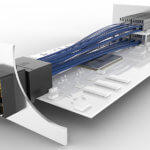I am a child of the 80s. I grew up when the idea of home computing was very new. My first experience of any kind of computer was an Apple II that my Dad brought home from work. It was the only computer his company possessed, and every few weeks he would need to create a report that took nearly all weekend. I would wait patiently for Dad to finish because that’s when he would let me load the 5 ¼” floppy disc into the machine and play Galaxians. I loved that game.

As I got older, I became more interested in simulations rather than arcade games. I enjoyed motor racing, and I accumulated enough hours using Microsoft Flight Simulator that would have qualified me for a commercial license in the real world. These games improved my math, geography and history knowledge, not to mention my spatial awareness.
Despite this, I was never a fully-fledged computer nerd. I tried a little programming in Basic and even C when I was younger, but I think of myself more as a user than a hacker. However, playing with computers from an early age gave me a bedrock of confidence in the use of technology.
Digital Natives
My friends were geeks and nerds. The cool kids made fun of us, even if they secretly played Sonic the Hedgehog behind closed doors after school. 30 years later, computer games are cool. They have long since entered the mainstream, and the video games industry is now larger than Hollywood. There are entire generations of kids who have grown up with a game controller in their hands. Not only that, but the same kids cannot remember a time without the internet, smartphones or wireless broadband. They are described as “digitally native.”
The military has already understood the value of a whole generation of young adults who understand technology to the very core of their being. By specifying interfaces that have more to do with Super Mario than Super Hornets, the military has been able to tap into an instinctive skill set that simply does not need to be taught. This has been applied to everything from airborne drones to bomb disposal robots, reducing the learning curve needed to employ high technology systems.

However, this familiarity goes beyond the physical interface and motor skills that video games teach. Digitally native engineers, plenty of whom are already in the market, consume information in a different way to those of us born a generation earlier.
To give a perfect example, my daughter knew by the age of two that she could scroll through the gallery on my smartphone with the swipe of a finger. I remember that she got very confused by a physical photograph in a frame that would not change at her command. Despite being a relatively early adopter of technology, I have had to learn these skills. In contrast, my kids do not need to learn the same skills – technology is simply an integrated part of their lives.
The Smartphone Generation
Depending upon your viewpoint, it may horrify you that a child of 2 should already be able to control advanced technology. And let’s not forget quite how advanced a smartphone actually is – it is easy to take them for granted. However, my point is this: there are whole generations alive now for whom this is normal, and it will only get better/worse* (delete as you feel appropriate).
The key question for me is whether we are ready to embrace this skill set. As employers, colleagues, customers and suppliers, we need to know if we are doing enough to adapt for this new way of thinking. Modern, digitally native engineers will be able rely on such concepts as cloud computing, software-as-a-service (SaaS) and real-time online collaboration without a second thought.

Design At The Speed Of Imagination
An exceptionally talented designer I am proud to know once told me that his goal is to be able to design as quickly as he can imagine. Until recently, technology has not been quick enough to allow this, but things are changing. And the engineers who will be able to embrace these technologies to their fullest potential are the engineers who have grown up with them.
Are the rest of us going to be left behind? Maybe you should break out your console, load up your favorite game, and re-join the computer game generation…



Great article! I’ll be telling a story at Altium Live Next week about “Full Stack” Hardware Engineering and I reference my early Nintendo and Apple IIe Days as the starting point to my career.
Thanks Eli. I think a lot of us can say that video games served as an inspiration for our careers!